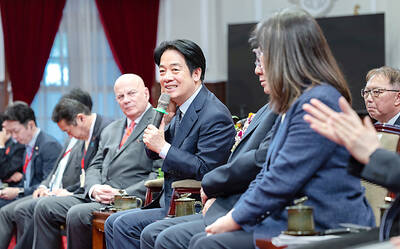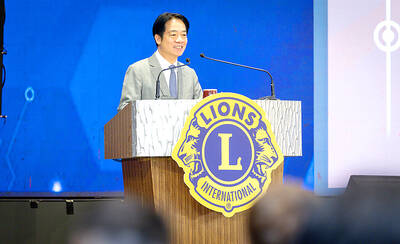The Red Cross Society of the Republic of China (ROC), which has raised nearly NT$1.7 billion (US$58.5 million) for disaster victims in Japan, more than all other Taiwanese charities combined, is facing criticism that most of the money has yet to leave Taiwan.
The complaints that only about a quarter of the money earmarked for Japan had been given to charitable aid efforts by yesterday came as attention focused on how the organization is managing the fund and how it plans to allocate the money.
“Every dollar we receive ultimately goes to Japan, but the donation drive is still ongoing and as a result, the dates and numbers are still subject to changes,” Red Cross Society of the ROC deputy secretary-general Lin Hsiu-fen (林秀芬) said.
The organization, partially state-run, has raised more than half of the NT$3 billion — including NT$300 million given by the government — pledged in aid by Taiwanese for Japan after a devastating earthquake and tsunami on March 11.
However, figures from the organization show that only US$15 million has been transferred to the Japanese Red Cross Society, the bulk of which was only wired yesterday after an internal decision was made on March 31.
The rest of the funds are sitting in a bank account as the group awaits more information on the kind of aid that Japanese relief groups require, officials with the Red Cross Society of the ROC said.
The interest earned from the money would be included in the final donation, Lin said.
However, the delay has infuriated online groups, with more than 20,000 people, as of yesterday, having joined a Facebook group calling on the organization to either immediately wire the remaining amount to Japan or refund all donations.
“What was given to Japan belongs to Japan,” Chiang Pin (江斌), posted on the Facebook group. “How Japan chooses to use that money is their business. [Taiwan’s Red Cross] should cough up.”
Another, Chen Jui-hsiung (陳瑞雄), said: “This time I donated directly to Japan’s representative office. Based on experience, I already had no confidence in the Red Cross Society.”
Phones were ringing around the clock at the Red Cross offices in Taipei, where volunteers were scrambling to answer calls about how the donations were being used. On average, it took four or five tries before callers were able to get through.
“As per our long-standing policy, we will honor refund requests. Our donors’ wishes are important to us and we will cooperate,” Lin said in response to the Facebook group, adding that the request would increase administrative costs.
The Red Cross Society of the ROC has come under fire in past.
In 2007, it was accused of misusing government subsidies. Financial statements from the organization showed that up to a third of its annual disaster relief fund had been set aside for office expenses between 2003 and 2006, in direct violation of caps on expenses.
The organization has also been criticized for its ongoing policy of giving kickbacks for fundraisers, which reached 15 percent in its Taipei chapter in 2005 before the practice attracted the attention of regulators.
At a press conference at the legislature yesterday, Democratic Progressive Party (DPP) lawmakers said they were concerned about the transparency of the fund for Japan and questioned how much would be lost in administrative and overhead costs.
“There are many valid concerns and I think [the Red Cross] needs to make themselves very clear,” DPP Legislator Yeh Yi-jin (葉宜津) said. “If they can’t, we will call on the public to boycott all donations to this secretive organization.”
Red Cross Society of the ROC officials said that many concerns were based on misconceptions about how the organization operates.
As per past practice, it has always distributed large disaster relief funds in stages depending on the needs of each particular relief operation. In the case of Japan, more funds will be distributed once long-term reconstruction efforts are finalized.
“The goals of the Red Cross’ efforts in Japan are not just disaster relief, but also long-term reconstruction efforts. We give the money in stages depending on the needs of disaster-zone residents over time,” the organization said in a statement.
Regarding claims by DPP Legislator Gao Jyh-peng (高志鵬) that senior organization administrators made as much as NT$200,000 a month, Red Cross Society of the ROC officials said that most senior administrators “would be happy if they earned half that amount.”
However, organization officials declined to answer questions on what percentage of the NT$1.7 billion received so far would be diverted to overhead costs and how much would eventually be wired to Japan.
It would be “unfair” to separate the fund this way, they said.
Organization officials said a final tally of the fund would be made on May 10 when the donation program ended.
Detailed documents on how the money was spent would be made public at that time, officials said.
Minister of Foreign Affairs Timothy Yang (楊進添) said he believed the Red Cross Society of the ROC would handle the money properly according to the needs of Japan in its disaster relief and reconstruction projects.
“Both the Red Cross Society of the ROC and the Japanese Red Cross Society are trustworthy,” Yang said.
Whether donations should be sent to Japan in instalments and how the money should be spent are decisions that should be made by the Red Cross Society of the ROC and Japanese Red Cross Society, Yang said.
Additional reporting by Shih Hsiu-chuan

Two US House of Representatives committees yesterday condemned China’s attempt to orchestrate a crash involving Vice President Hsiao Bi-khim’s (蕭美琴) car when she visited the Czech Republic last year as vice president-elect. Czech local media in March last year reported that a Chinese diplomat had run a red light while following Hsiao’s car from the airport, and Czech intelligence last week told local media that Chinese diplomats and agents had also planned to stage a demonstrative car collision. Hsiao on Saturday shared a Reuters news report on the incident through her account on social media platform X and wrote: “I

‘BUILDING PARTNERSHIPS’: The US military’s aim is to continue to make any potential Chinese invasion more difficult than it already is, US General Ronald Clark said The likelihood of China invading Taiwan without contest is “very, very small” because the Taiwan Strait is under constant surveillance by multiple countries, a US general has said. General Ronald Clark, commanding officer of US Army Pacific (USARPAC), the US Army’s largest service component command, made the remarks during a dialogue hosted on Friday by Washington-based think tank the Center for Strategic and International Studies. Asked by the event host what the Chinese military has learned from its US counterpart over the years, Clark said that the first lesson is that the skill and will of US service members are “unmatched.” The second

STANDING TOGETHER: Amid China’s increasingly aggressive activities, nations must join forces in detecting and dealing with incursions, a Taiwanese official said Two senior Philippine officials and one former official yesterday attended the Taiwan International Ocean Forum in Taipei, the first high-level visit since the Philippines in April lifted a ban on such travel to Taiwan. The Ocean Affairs Council hosted the two-day event at the National Taiwan University Hospital International Convention Center. Philippine Navy spokesman Rear Admiral Roy Vincent Trinidad, Coast Guard spokesman Grand Commodore Jay Tarriela and former Philippine Presidential Communications Office assistant secretary Michel del Rosario participated in the forum. More than 100 officials, experts and entrepreneurs from 15 nations participated in the forum, which included discussions on countering China’s hybrid warfare

MORE DEMOCRACY: The only solution to Taiwan’s current democratic issues involves more democracy, including Constitutional Court rulings and citizens exercising their civil rights , Lai said The People’s Republic of China (PRC) is not the “motherland” of the Republic of China (ROC) and has never owned Taiwan, President William Lai (賴清德) said yesterday. The speech was the third in a series of 10 that Lai is scheduled to deliver across Taiwan. Taiwan is facing external threats from China, Lai said at a Lions Clubs International banquet in Hsinchu. For example, on June 21 the army detected 12 Chinese aircraft, eight of which entered Taiwanese waters, as well as six Chinese warships that remained in the waters around Taiwan, he said. Beyond military and political intimidation, Taiwan